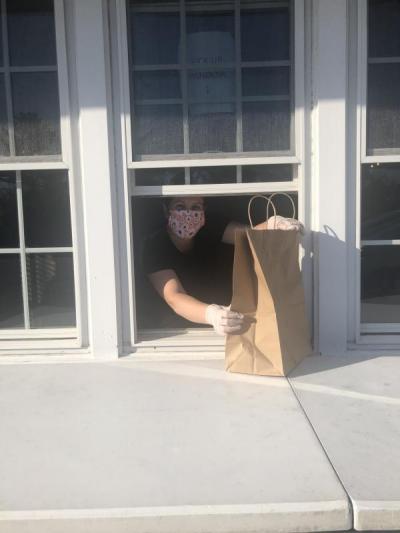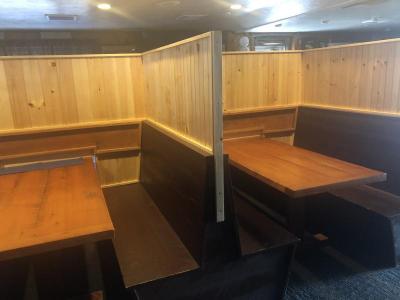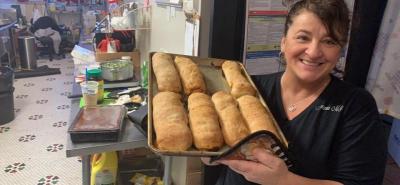“Throwing a dart at a board with your eyes closed”: Restaurateurs work through pandemic
Restaurants across Wareham have had to dramatically change their business model since the ban on dining in restaurants in mid-March, and those that are open are continually working to adjust to customer demand.
The Stonebridge Bar and Grill, Ella’s Wood Burning Oven Restaurant, Mumma Mary’s, and the Gateway Tavern have all made changes to their staffing, menus, and operations in an attempt to adapt to quickly-changing expectations.
For Justin Hadley, the owner of Stonebridge Bar and Grill in Onset, ordering supplies has been one of the biggest challenges during the pandemic. Reckoning with food shortages and unpredictable demand from customers, Hadley often ends up looking at several suppliers for the food he needs.
Hadley said he is inundated with emails from suppliers, and odd items on offer. One week, Sysco had no hamburger meat available, but an abundance of beef heart, tongue, and organ meats.
He also lost a fair amount of inventory when the shutdown began as he had kegs, red meat, and other food that can’t be kept for long.
“We lost about 20 grand in that first month,” Hadley said. “That’s life. We’re all safe -- that’s the most important thing.”
Hadley said that the fact that his business is already highly seasonal has been helpful. He is used to socking away a nest egg of funds to get through the winter, and the lack of snow means that fund is in better shape than usual.
Now, he is looking ahead towards an opening that will require him to hire and train an extensive staff very quickly, and recalculate how much he needs to buy to stock the restaurant.
“It’s like throwing a dart at a board with your eyes closed,” Hadley said.
When restaurants do reopen, Hadley said it would be helpful for customers to try to dine at off hours when things are less crowded.
Ella’s Wood Burning Oven Restaurant, located on Cranberry Highway, is serving new menu items while closed.
Marc and Bree Swierkowski, the restaurant’s owners and a married couple, had a conversation early in the shutdown about what customers might want from restaurants.
The couple thought that families who were working and learning from home might struggle at dinner time, and so they launched a family meals menu. The family meals include four servings of dishes that change week to week, but have included Guinness braised pork, macaroni and cheese, and holiday-themed offerings like tacos for Cinco de Mayo.
The family meals all need to be pre-ordered at least four days in advance, so the restaurant can order only what they need to cook.
“It’s working out, but it feels like every day we’re restructuring our whole business plan based on what works and what doesn’t,” said Bree Swierkowski.
Ella’s is also serving pre-mixed cocktails that include everything but the liquor, which can be added by customers. A mango margarita mix served on Cinco de Mayo was a particularly big hit, Swierkowski said.
Swierkowski said that balancing the staffing needs of the restaurant with the requirements of the federal Paycheck Protection Program, her desire to minimize the number of people in the restaurant, and her drive to employ as many people as possible has been challenging -- especially with the extra $600 from the Federal Government added to unemployment checks. The Paycheck Protection Program gives loans to small business owners to allow them to keep employees on the payroll. The loans will be forgiven if all employees are kept on the payroll for eight weeks and the money is used for payroll, rent, mortgage interest, or utilities.
However, she feels confident that she will be able to re-employ all her staff when it is safe to do so.
“Regardless of what the government tells us, it will be a very personal decision for us to reopen. We want customers to feel safe ordering from us,” Swierkowski said. Ella’s will likely remain take-out only for some time after dining in is allowed, Swierkowski said, because she doesn’t want the restaurant to be part of a possible spike in cases.
Mary Labonte, the owner of Mumma Mary’s on Main Street, said that her business has been good since the ban on dining in. She had been worried that she would see sales plummet, but after the first week, things were back to normal.
Before the pandemic, about half of her sales were for take-out, which perhaps eased the transition.
She has set up a table in front of her restaurant’s door where she -- masked and gloved -- meets customers to hand over her homemade Italian food.
Currently, Labonte and her husband are working at the restaurant alone. Because she makes all her food from scratch, it can be a challenge, but she is keeping up with the demand.
Labonte said that even if restaurants are allowed to reopen on May 18, she will stick with a take-out only model for some time. She plans to allow customers to enter the restaurant and add a freezer chest stocked with frozen meals, the dessert case, and the drinks cooler to allow more options for customers.
Labonte said that her daily specials have been particularly popular during the pandemic, especially the chicken pot pie she serves on Mondays and the Sicilian pizza she whips up on Tuesdays.
The Gateway Tavern, located on Route 6, was at first completely closed after Governor Charlie Baker mandated that all restaurants serve food only for take-out. After a number of calls from customers asking for the restaurant to reopen, the tavern reopened four days a week, staffed by owner Joe Sauro and a few employees who wanted to come back to work.
Sauro said that he has had trouble bringing staff back to work in part because of the additional $600 being given weekly by the federal government to those receiving unemployment. Because staff would not be working full-time, and the number of customers visiting the restaurant are down, there is no way for staff to earn more while working than while unemployed. Most of the people working at the Gateway now are those who were ineligible for unemployment.
Before the pandemic, take-out was only about three or four percent of the Tavern’s sales.
The Tavern makes the vast majority of its money on drinks. About 40 to 45 percent of the price of food goes to supplies, while the profit margin is far higher on drinks.
Being able to sell beer and wine to-go has not been much of a windfall for the business, Sauro said, as it is cheaper for customers to buy drinks at the liquor store.
Over the last 45 days, Sauro estimates that he has lost about $300,000 in sales.
Sauro said he is worried about the future. When restrictions are lifted, will people be able to crowd around the bar, or sit in large groups at restaurant tables?
He has proactively hired a carpenter to install wooden barriers between all the booths, in case that would allow him to open more quickly. Sauro also runs two bars that don’t serve any food -- The Stowaway in Mattapoisett and the Duck Inn Pub in Hyannis -- and is concerned that he won’t be able to open those businesses in the next 18 months. In the meantime, he is still on the hook for the rent, utilities, cable, and other costs of those locations.
“We’re all in the same storm, but we’re not in the same boat,” Sauro said.
He acknowledged that he has been very lucky throughout his career, but said that while many people continue working or are paid to stay home, he and his staff are among the 20 percent of people whose lives have been stopped by the virus.














